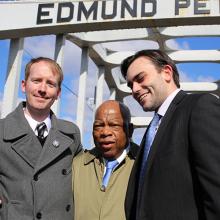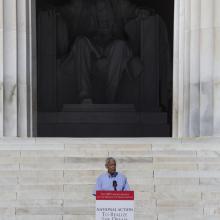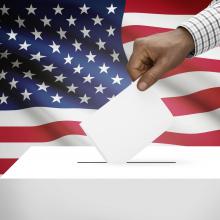Civil Rights Movement
CIVIL RIGHTS LEADER Ella Baker utilized the strength of her voice at the height of that movement to fundamentally question the notions and ideas of equality and leadership in this nation. In 1969, Baker said, “[T]he system under which we now exist has to be radically changed.” This means “facing a system that does not lend itself to your needs and devising means by which you change that system.”
Black women have long been considered the backbone for civil rights, social justice, church advancement, and animators of democracy in the United States. If this is so, then why are so many still overlooked for advancement in political power as well as the everyday jobs that they are more than qualified for?
While “women” won the right to vote in 1920, Black women fought for about another half century to exercise their right. The inequities of gender, race, and access are still with us — and there is no greater time than now to push hard for political and social advancement.
WHEN VILLANOVA PROFESSOR Vincent W. Lloyd reflects on the theology of the phrase “Black Lives Matter,” he begins with the “death-dealing forces of white supremacy” and the tragic “ vulnerability to premature death” experienced by Black people. But Lloyd doesn’t stop there. To affirm the value of Black lives, Lloyd writes, requires life that is rich, creative, and flourishing.
Lloyd doesn’t think such flourishing is possible without faith. Specifically, he argues that to hold on to “a hope against hope” in the face of these noxious, murderous systems and practices requires belief in the possibility of life after death: “For Black life to matter,” Lloyd writes, “we must believe in resurrection.” As Carmen Acevedo Butcher puts it in her interview with Betsy Shirley, “It may not look like it,” but “Love’s in charge.” That’s an important reminder for all of us, in this Easter season and always.
On a lighter note: We’re pleased to have a guest appearance by our former art director (and humor columnist) Ed Spivey Jr., who came out of retirement to offer his pearls of wisdom on artificial and other kinds of intelligence.
Rustin, who died in 1987, is best known for helping Rev. Martin Luther King Jr. implement Gandhian tactics of nonviolence and for the key role he played organizing the 1963 March on Washington and the Southern Christian Leadership Conference — two key components of the civil rights movement.
Less well-known are the particularities of Rustin's faith, including his deep roots in the Quaker and African Methodist Episcopal churches which drove his activism. Those two faith traditions, marked by silence and singing, respectively, echoed throughout Rustin’s life and work.
I spent many hours just looking at the Edmund Pettus Bridge. The words that kept coming to me were “courage” and “gratitude,” and the question that surfaced was: What bridge we will now have to cross?
Although more politically conservative and evangelical voices are joining in the #BLM chants of “No Justice, No Peace,” there are undoubtedly shaky voices and (perhaps hostile) minds who hold that while black lives do matter “in theory,” radical institutional change is far too dangerous and subversive, if not completely un-American.
In the second season of The Soul of the Nation, Jim Wallis is sitting down with some of the presidential candidates to discuss how their faith informs their work. Following is a transcript of Wallis’ interview with Sen. Cory Booker, discussing Booker’s faith, the role of faith in the public square, his favorite hymn, and more.
“Echol Cole and Robert Walker represented the struggle of working people then, and still do today,” said AFSCME President Lee Saunders. “We honor them and the brave men who took on a racist, rigged system and vow to continue fighting for economic justice for all workers.”
What advice to civil rights veterans have for those weary from weeks of protests?
"Suck it up. It's too important not to," Joan Trumpauer Mulholland told Full Frontal with Samantha Bee's Ashley Nicole Black.

Left to right, Nate Powell, Rep. John Lewis, and Andrew Aydin. Image via Sandi Villarreal / Top Shelf Productions / RNS
Q: Representative Lewis, in an earlier book of this series we read that you were asked by church leaders to tone down your speech at the 1963 March on Washington. How does March: Book Three deal with issues of faith?
Lewis: Book Three tells a story how people kept going, how people never gave up or gave in, in spite of the bombing of a church, the beating on the bridge as we had left church to march all the way from Selma to Montgomery. We kept going, we never gave up, we never gave in, we never became bitter or hostile. We kept the faith. It was the music of the church that lifted us, that carried us. … We felt like God Almighty was on our side.
Rosa Parks held no elected office. She was not born into wealth or power. Yet sixty years ago today, Rosa Parks changed America. Refusing to give up a seat on a segregated bus was the simplest of gestures, but her grace, dignity, and refusal to tolerate injustice helped spark a Civil Rights Movement that spread across America. Just a few days after Rosa Parks’ arrest in Montgomery, Alabama, a little-known, 26 year-old pastor named Martin Luther King Jr. stood by her side, along with thousands of her fellow citizens. Together, they began a boycott. Three-hundred and eighty-five days later, the Montgomery buses were desegregated, and the entire foundation of Jim Crow began to crumble.
Today’s radical black Christians may not line up with our nation’s romanticized image of Martin Luther King Jr.
In an Op-Ed over at NBCBLK, Brooke Obie discusses how many of the radical leaders at the forefront of the Black Lives Matter movement draw on deep Christian wells to inspire their activism, but express that faith very differently than the old heroes of the 1960s.

Julian Bond. Image via Joseph Sohm/Shutterstock
Julian Bond, prominent civil rights activist in the 1960s and later chairman of the N.A.A.C.P., died Saturday night at the age of 75, The New York Times reports.
Mr. Bond embodied many roles in his life, including "writer, poet, television commentator, lecturer and college teacher," and remained a prominent spokesperson for justice causes — including as part of the Fast for Families for immigration reform, alongside Sojourners — until his death.

Image via Niyazz/Shutterstock
Today is the 50th anniversary of the landmark Voting Rights Act, passed Aug, 6, 1965. The act, signed into law by President Lyndon B. Johnson, created key provisions to prevent racial discrimination in voting laws.
The Voting Rights Act has been called "the single most effective piece of civil rights legislation ever passed by Congress."
Today's anniversary is a bittersweet commemoration. In 2013, the Supreme Court struck down Section 4, which had required Alabama, Alaska, Arizona, Georgia, Louisiana, Mississippi, South Carolina, Texas, and Virginia to seek federal approval before imposing changes to voter laws.
If the influential Catholic writer Thomas Merton were alive today, he would likely have strong words about police brutality and racial profiling.
Back in 1963, Merton called the civil rights movement “the most providential hour, the kairos not merely of the Negro, but of the white man.”
His words echoed May 16 among black pastors at a conference, titled Sacred Journeys and the Legacy of Thomas Merton, hosted by Louisville’s Center for Interfaith Relations. The event marked the 100th anniversary of Merton’s birth.
Black Future Month, a term coined by the new black vanguard, seeks to build upon the robust legacy of our foreparents while refusing to nostalgically rest upon their laurels. Black Future Month affirms our collective history of struggle, resilience, and achievement, while centering our present predicament in all its urgency. As this movement progresses, it’ll be imperative that we retain the spiritual foundation which anchored the freedom fighting of our ancestors,’ but this retention cannot come at the expense of passing the baton off to emerging leadership. We must go forward together, acknowledging that we need the collective wisdom of our people to navigate the troubled waters that surround us on all sides.
Black Future Month emerges from the #BlackLivesMater movement and the awareness that we’re in the midst of a watershed moment. There are currently “more African-American adults under correctional control, in prison or jail, on probation or parole, than were enslaved in 1850, a decade before the Civil War.” Black people currently constitute 12 percent of our nation’s populace, yet represent 40 percent of the nation’s incarcerated population. It’s estimated that 1 in every 3 black males will serve time in jail or prison in their lifetime and that 1 in 13 black people cannot vote due to felon disenfranchisement. As bleak as these realities are, mass incarceration is just a portion of the burden we’re bearing.
Revolutionary Love
Revolutionary love has given birth to new life.
We are gasping, breathing (I can’t breathe)
Screaming (We have nothing to lose but our chains)
We have been in the womb long enough
Blinking to the blinding light of the revolution
Our eyes adjusting
And we answer with what love looks like in public
Justice
I’ve been thinking about the life birthed out of revolutionary love. The night I met Waltrina, we stayed up until an ungodly hour — instant sister-friends. We bonded, talking about everything, about finding and losing faith — in God and humanity — then slowly picking it up again piece by piece, about being the diversity in mostly white professional spaces, about friends, family, and the struggle to find our places (as 30-somethings) in this “new” freedom movement.
Out of a deep revolutionary love inspired by Jesus and nourished from the well of our people, we have determined to get in where we fit in, living out the belief that there is a place for everyone in the movement.
Today's fight against the powers and principalities of systemic injustice cannot be left to the continued service of the elders that survived the 1960s civil rights movement, nor hoisted solely upon the shoulders of the teens and 20-somethings of today, just because they have energy and new ideas. Despite the focus on elders and youth, this is an intergenerational movement that requires all of us to answer the communal call. I am encouraged by one of my mentors, Mama Ruby (Sales) who says it is time to have all hands on deck.
The zeitgeist is clear. Much like Emmett Till’s murder in 1955 sparked the civil rights movement, the tragic string of murders of blacks in 2014 catalyzed another movement, the #BlackLivesMatter movement. This movement picks up where the civil rights movement left off, addressing systemic racial injustice in the legal and penal system, educational system, and economic system. In some ways, the battles we fight are more challenging than the ones our grandparents fought. Undeniably, we face off in a more complex world and against forms of systemic racism that are so subtle that they are almost invisible. Nevertheless, due to a unique combination of gifts and experiences, I’m hopeful that my generation of black millennials is ready to lead us on to a more equitable society. Here’s why.
1. We are propelled by the prophetic legacy of the past.
With a technological savvy that gives us unprecedented access to the true history of our people, and as perhaps the last generation to breathe the same air as the civil rights generation, we draw upon the legacies of the past as we move forward. When I sense that my capacity to forgive is waning, I recall my recent conversations with several survivors of the 16th Street Baptist Church bombing in Birmingham, Ala., and I’m reminded of the inner healing that forgiveness promises. When I am tempted to pander to the powers that be, I call my radical granddad and ask him to tell me again about the many Black Panthers meetings that took place at the church he pastored in Berkeley, Calif., in the 1960s. When I feel that I’m losing my courage, I read Ida B. Wells’ autobiography and am reminded that we are not alone. We are connected — part of a chain of black activists, each generation inspiring the next. Our heroes guide us every day.














